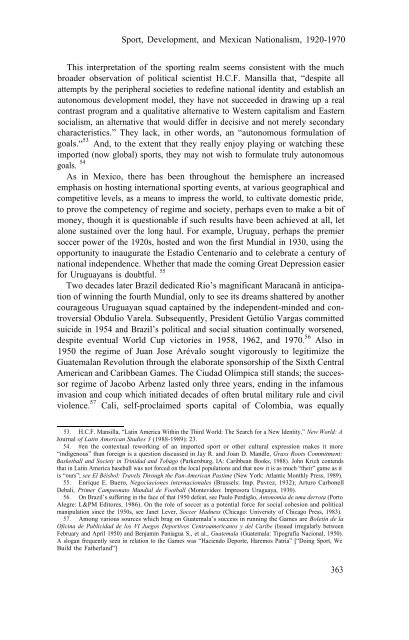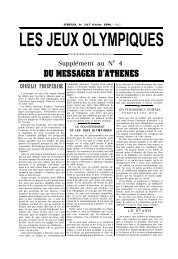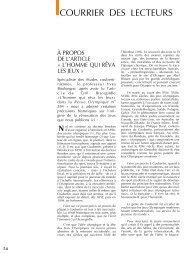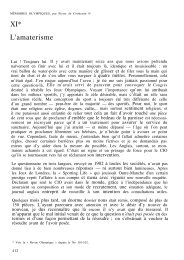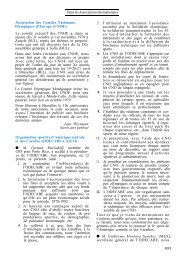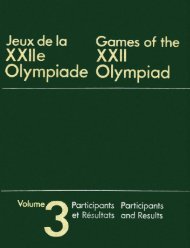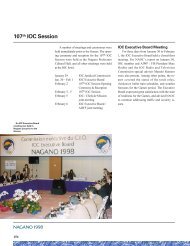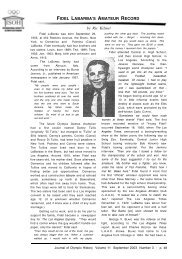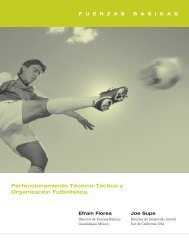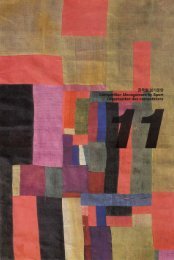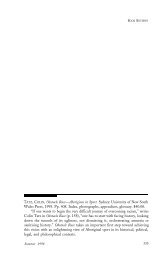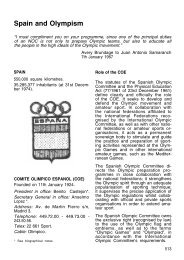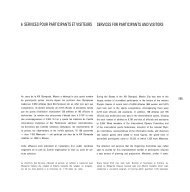Sport Development and Mexican Nationalism - LA84 Foundation
Sport Development and Mexican Nationalism - LA84 Foundation
Sport Development and Mexican Nationalism - LA84 Foundation
You also want an ePaper? Increase the reach of your titles
YUMPU automatically turns print PDFs into web optimized ePapers that Google loves.
<strong>Sport</strong>, <strong>Development</strong>, <strong>and</strong> <strong>Mexican</strong> <strong>Nationalism</strong>, 1920-1970<br />
This interpretation of the sporting realm seems consistent with the much<br />
broader observation of political scientist H.C.F. Mansilla that, “despite all<br />
attempts by the peripheral societies to redefine national identity <strong>and</strong> establish an<br />
autonomous development model, they have not succeeded in drawing up a real<br />
contrast program <strong>and</strong> a qualitative alternative to Western capitalism <strong>and</strong> Eastern<br />
socialism, an alternative that would differ in decisive <strong>and</strong> not merely secondary<br />
characteristics.” They lack, in other words, an “autonomous formulation of<br />
goals.“ 53 And, to the extent that they really enjoy playing or watching these<br />
imported (now global) sports, they may not wish to formulate truly autonomous<br />
goals. 54<br />
As in Mexico, there has been throughout the hemisphere an increased<br />
emphasis on hosting international sporting events, at various geographical <strong>and</strong><br />
competitive levels, as a means to impress the world, to cultivate domestic pride,<br />
to prove the competency of regime <strong>and</strong> society, perhaps even to make a bit of<br />
money, though it is questionable if such results have been achieved at all, let<br />
alone sustained over the long haul. For example, Uruguay, perhaps the premier<br />
soccer power of the 1920s, hosted <strong>and</strong> won the first Mundial in 1930, using the<br />
opportunity to inaugurate the Estadio Centenario <strong>and</strong> to celebrate a century of<br />
national independence. Whether that made the coming Great Depression easier<br />
for Uruguayans is doubtful. 55<br />
Two decades later Brazil dedicated Rio’s magnificant Maracanã in anticipation<br />
of winning the fourth Mundial, only to see its dreams shattered by another<br />
courageous Uruguayan squad captained by the independent-minded <strong>and</strong> controversial<br />
Obdulio Varela. Subsequently, President Getúlio Vargas committed<br />
suicide in 1954 <strong>and</strong> Brazil’s political <strong>and</strong> social situation continually worsened,<br />
despite eventual World Cup victories in 1958, 1962, <strong>and</strong> 1970. 56 Also in<br />
1950 the regime of Juan Jose Arévalo sought vigorously to legitimize the<br />
Guatemalan Revolution through the elaborate sponsorship of the Sixth Central<br />
American <strong>and</strong> Caribbean Games. The Ciudad Olímpica still st<strong>and</strong>s; the successor<br />
regime of Jacobo Arbenz lasted only three years, ending in the infamous<br />
invasion <strong>and</strong> coup which initiated decades of often brutal military rule <strong>and</strong> civil<br />
violence. 57 Cali, self-proclaimed sports capital of Colombia, was equally<br />
53. H.C.F. Mansilla, “Latin America Within the Third World: The Search for a New Identity,” New World: A<br />
Journal of Latin American Studies 3 (1988-1989): 23.<br />
54. #en the contextual reworking of an imported sport or other cultural expression makes it more<br />
“indigenous” than foreign is a question discussed in Jay R. <strong>and</strong> Joan D. M<strong>and</strong>le, Grass Roots Commitment:<br />
Basketball <strong>and</strong> Society in Trinidad <strong>and</strong> Tobago (Parkersburg, IA: Caribbean Books, 1988). John Krich contends<br />
that in Latin America baseball was not forced on the local populations <strong>and</strong> that now it is as much “their” game as it<br />
is “ours”; see El Béisbol: Travels Through the Pan-American Pastime (New York: Atlantic Monthly Press, 1989).<br />
55. Enrique E. Buero, Negociaciones internacionales (Brussels: Imp. Puvrez, 1932); Arturo Carbonell<br />
Debali, Primer Campeonato Mundial de Football (Montevideo: Impresora Uruguaya, 1930).<br />
56. On Brazil’s suffering in the face of that 1950 defeat, see Paulo Perdigão, Antonomia de uma derrota (Porto<br />
Alegre: L&PM Editores, 1986). On the role of soccer as a potential force for social cohesion <strong>and</strong> political<br />
manipulation since the 1950s, see Janet Lever, Soccer Madness (Chicago: University of Chicago Press, 1983).<br />
57. Among various sources which brag on Guatemala’s success in running the Games are Boletín de la<br />
Oficina de Publicidad de los VI Juegos Deportivos Centroamericanos y del Caribe (Issued irregularly between<br />
February <strong>and</strong> April 1950) <strong>and</strong> Benjamin Paniagua S., et al., Guatemala (Guatemala: Tipografía Nacional, 1950).<br />
A slogan frequently seen in relation to the Games was “Haciendo Deporte, Haremos Patria” [“Doing <strong>Sport</strong>, We<br />
Build the Fatherl<strong>and</strong>”]<br />
363


